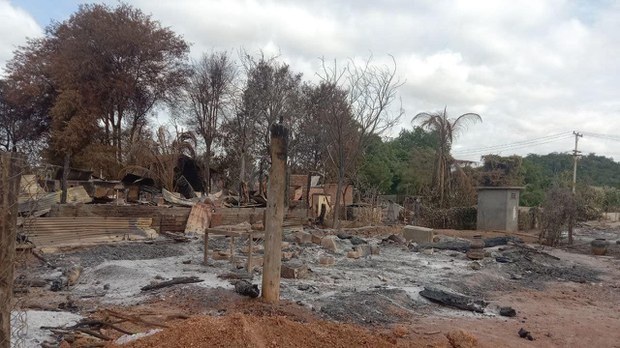Nine killed in junta raids on Myanmar villages near China-backed copper mine
At least nine civilians are dead, and dozens are missing after a month of military raids on villages near a China-backed copper mine in Myanmar’s Sagaing region that prodemocracy paramilitaries had threatened to destroy because it could provide income for the junta, residents said Wednesday. Sources in Sagaing’s embattled Salingyi township told RFA Burmese that at least seven residents of Done Taw, Moe Gyoe Pyin (North), Ton, and Hpaung Ka Tar villages were killed, and three others reported missing following junta troops raids from June 15-25. Two men from Salingyi’s Ywar Thar village were taken hostage by the military on May 25 and later killed, they said. Speaking on condition of anonymity, citing fear of reprisal, a resident of Moe Gyoe Pyin (North) told RFA that Tin Soe, 46, and Wa Gyi, 47, were killed when the military shelled his village early on the morning of June 21, before setting fire to homes there later that day. “They came in so fast; some people were not able to escape, and some were trapped,” the resident said. “As they were killing people and burning houses, no one dared to stay. We just had to flee.” The resident said that “around 20 people were taken hostage” during the raid and that the bodies of the two victims were discovered after the troops left the following day. Other sources from the area told RFA that the body of 30-year-old Sai Myat Soe from Sar Htone village was found mutilated on June 26 near Hpaung Ka Tar village. Junta troops attacked the Salingyi villages of Nat Kyun and Htan Taw Gyi as recently as Tuesday, residents said, forcing inhabitants to evacuate and seek shelter. A woman who had to flee her home during Tuesday’s raid said she was separated from her family members during the ordeal and doesn’t know what became of them. “I went back to the village today hoping things had calmed down, but just as we arrived at the village, soldiers came in from the other side through the forest, while others approached from the river. We had to leave right away,” she said. “My whole family is on the run and I’m worried whether I’ll ever see them again or if I’ll be able to go back to my house. I can’t stop worrying because [the soldiers] were burning the villages.” Sources claimed that the raids were conducted by military units based in a compound run by China’s Wanbao Mining Ltd., which operates the Letpadaung Copper Mine – a joint venture between the Chinese government and the junta that has been suspended for the 16 months since the military seized power in a Feb. 1, 2021 coup. Other villages targeted in the raids included Lin Sa Kyet and Wadan, they said. The raids follow an April 21 warning issued by 16 local People’s Defense Force (PDF) paramilitary groups that the Letpadaung copper project would be attacked because it could provide income for the junta. Attempts by RFA to contact junta Deputy Minister of Information Maj. Gen. Zaw Min Tun went unanswered Wednesday. He has previously rejected reports of military raids, as well as allegations of civilian deaths and acts of arson by junta troops. Caught in the crossfire Members of the local anti-junta People’s Defense Force (PDF) paramilitary group have said they are reluctant to intercept the raids for fear of causing civilian casualties while the military holds hostages. However, the group has attacked military units stationed within the copper project compound and recently destroyed a power line connected to the site. Wanbao has strongly condemned attacks in the region, saying in a statement that its presence has nothing to do with the ongoing civil unrest in Myanmar and demanding that armed groups in the area refrain from targeting its employees. A member of the anti-junta Salingyi Revolution Army (SRA) said that Myanmar’s shadow National Unity Government (NUG), to which local PDF forces have sworn loyalty, has never ordered attacks on Wanbao or its employees. “We haven’t attacked Wanbao, only the military units housed in the compound,” said the SRA fighter, who also declined to be named. “Of course, some of [Wanbao’s] equipment might get destroyed in the chaos, but our NUG government has not instructed us to attack Wanbao and we would never do it on our own. The local defense groups are following the guidelines and instructions of the NUG.” In an interview on May 29, Zaw Min Tun told RFA that all governments have a responsibility to protect foreign investment on both legal grounds and for reasons of security. He said at the time that the military’s use of force to clear the territory was aimed at protecting the Chinese project. Thet Oo, a member of the prodemocracy Salingyi Multi-Village Strike Steering Committee, told RFA that the junta has deployed “two military columns for clearance operations in the Letpadaung area,” indicated that it “is clearly concerned with defending the Chinese project.” But he said that his and other PDF units in the area do not want the mine to resume operations because profits from the project will be used by the junta to fund its repression of Myanmar’s people. According to local sources, military raids have forced around 20,000 residents of 25 villages near the project site to flee their homes and take shelter in the jungle. Translated by Khin Maung Nyane. Written in English by Joshua Lipes.



